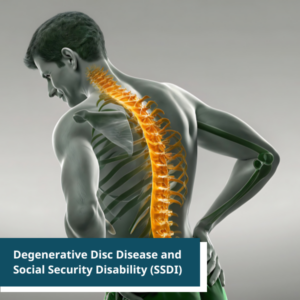
A degenerative disc disease (DDD) diagnosis can leave you with a lot of unanswered questions. “Is degenerative disc disease a disability?” “Can you get disability benefits for degenerative disc disease?” “How do I prove my disability to Social Security?” An experienced disability attorney can answer these and more and help you pursue the Social Security disability benefits you need to support yourself.
Is Degenerative Disc Disease a Disability?
Is DDD a disability?
Degenerative disc disease is a condition that causes spinal discs to lose flexibility, cushioning, and strength over time. This can lead to severe pain, numbness, or muscle weakness that limits daily activities and work. While many people experience some disc degeneration with age, not everyone develops disabling symptoms. The Social Security Administration (SSA) does include degenerative disc disease in its official Listing of Impairments under the Musculoskeletal Disorders section. You could qualify for disability benefits if you provide medical documentation of serious limitations that prevent you from working.
Can I Qualify for SSDI Benefits with Degenerative Disc Disease?
Yes, you could qualify for Social Security Disability Insurance (SSDI) benefits if your degenerative disc disease prevents you from working full-time. To determine whether you are eligible, Social Security will consider whether your symptoms are equivalent to a listed impairment, such as a spinal disorder that involves nerve root compression. Even if your condition does not match a listing, you might still qualify through a residual functional capacity (RFC) assessment, which evaluates how your symptoms limit your ability to work.
How to Apply for Disability for Degenerative Disc Disease
You must submit an application to the SSA with detailed information about your medical history, work background, and daily limitations to apply for SSDI benefits. Include treatment records, imaging results, and notes from doctors that describe the severity of your condition. You will also need to provide employment information and documentation of your earnings. The SSA will review these details to decide whether you meet the requirements.
Strengthening Your DDD Disability Claim
You can improve your SSDI claim by submitting strong evidence and up-to-date records. Proof of consistent treatment, specialist evaluations, and clear links between your symptoms and functional limitations carries weight in Social Security’s review process. Personal statements about how pain and mobility issues affect your work can also support your claim. Working with a disability attorney can make the process of gathering and presenting this evidence more manageable.
SSI vs. SSDI: Which is Right for You?
Supplemental Security Income (SSI) and SSDI benefits both provide financial support to people who cannot work, but the programs differ when it comes to eligibility. SSI is available to individuals with limited income and resources, regardless of their work history. SSDI is only available to applicants who have worked and made payroll tax contributions in the past. Some people qualify for both programs.
FAQs About Degenerative Disc Disease
If you’re applying for Social Security benefits, you likely have many questions about eligibility and the claims process. The following FAQ section provides clear answers to common questions about qualifications, benefit amounts, and how the SSA evaluates different forms of the condition.
How much disability can you get for degenerative disc disease?
The amount of disability benefits you can receive for degenerative disc disease depends on which program you qualify for under SSA’s rules. SSDI benefits are based on your past earnings and contributions to Social Security. SSI payments are subject to a federal maximum, which can decrease if you exceed certain income or support limits. Your benefits might not match your previous level of income, but they can help with your living expenses if your condition prevents you from maintaining consistent employment.
Is degenerative disc disease a permanent disability?
Degenerative disc disease often progresses over time, but whether it counts as a permanent disability depends on your medical records and symptoms. The SSA will look at whether your condition prevents you from engaging in long-term work for 12 months or longer to determine your eligibility for benefits. If your doctors do not expect you to recover within that timeframe, the SSA might view your condition as permanent for disability purposes.
Is multilevel degenerative disc disease a disability?
Multilevel degenerative disc disease involves damage to more than one spinal disc. This condition often results in increased pain, weakness, and limitations. However, Social Security does not evaluate disability claims based on the number of discs affected. Instead, it focuses on whether your combined symptoms prevent you from performing your job duties. If multilevel disease causes severe limitations, you might qualify for disability benefits.
Is mild degenerative disc disease a disability?
Mild degenerative disc disease may not qualify as a disability on its own. Many people with early-stage disc degeneration continue to work without major restrictions. You must show that your symptoms create significant, long-term limits on your working ability to receive disability benefits. If your medical evidence shows only mild symptoms, the SSA is unlikely to approve your claim. However, you might eventually become eligible over time due to worsening symptoms or new complications.
How Ryan Bisher Ryan & Simons Can Help You
At Ryan Bisher Ryan & Simons, our attorneys bring decades of experience and a proven record of results to every disability claim we handle. When you choose our firm, you’ll work directly with lawyers who understand the challenges you face and take the time to guide you through each step of the claims process. We will thoroughly prepare your case and fight for the benefits you are due, appealing a denied claim if necessary. Our team has recovered millions of dollars in disability benefits and other payouts for our clients over the years. We understand what it takes to secure real results for those we represent.
Contact a Disability Lawyer Now
If degenerative disc disease keeps you from working, you deserve clear guidance about your options. Disability claims involve strict requirements and eligibility criteria, but you do not have to manage these on your own. A disability lawyer from Ryan Bisher Ryan & Simons can review your situation, walk you through your next steps, and prepare your claim in a way that meets Social Security’s standards. Contact us today for a free initial consultation to learn how we can help with your disability claim.


